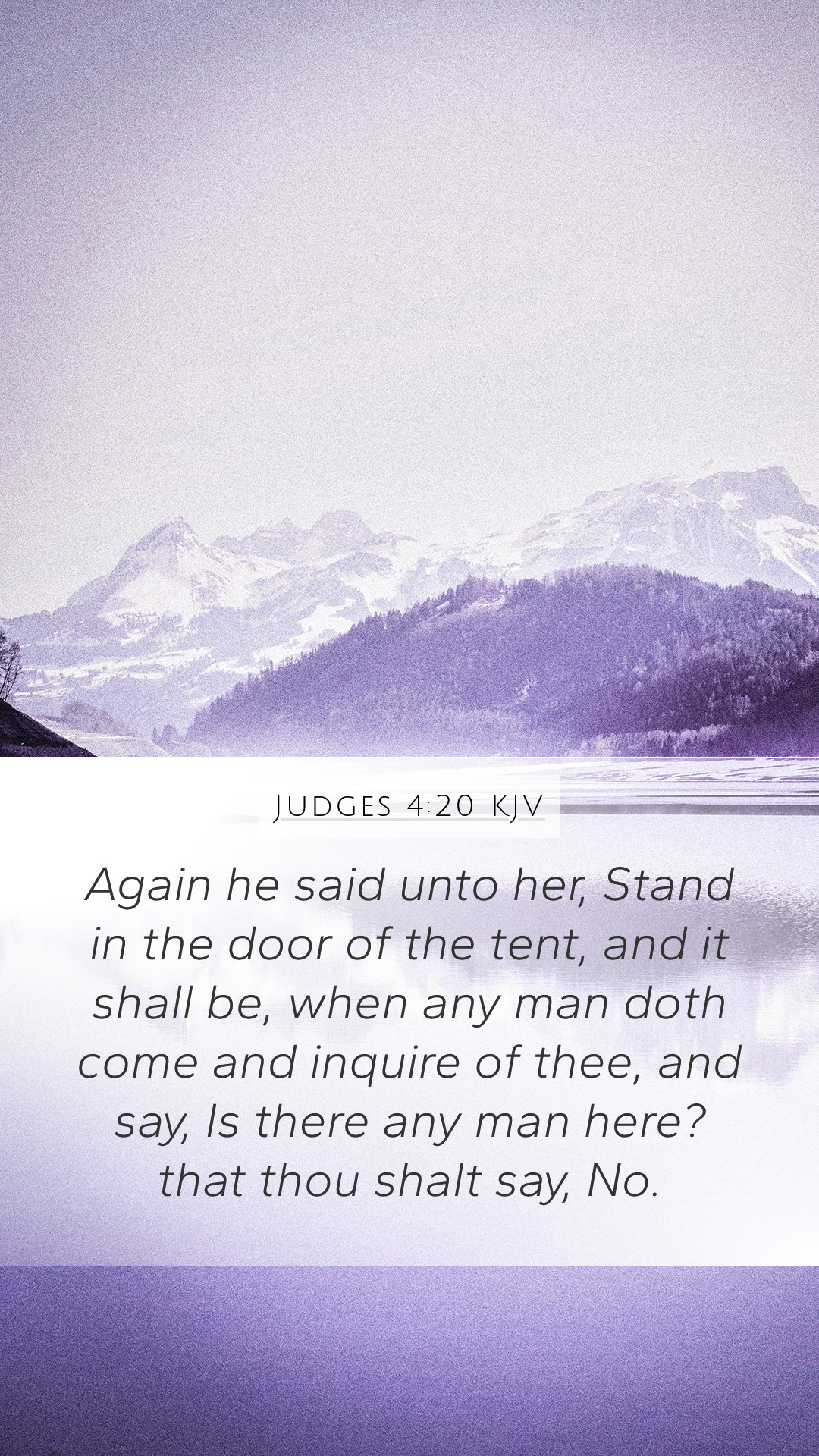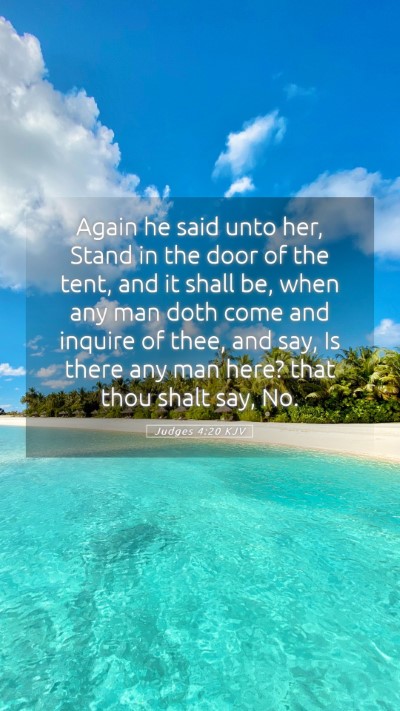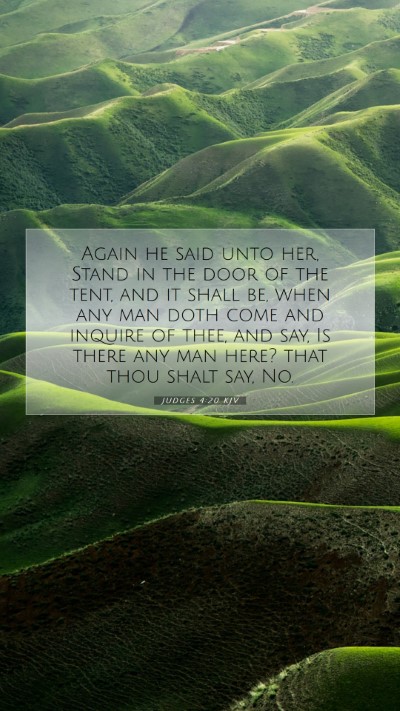Old Testament
Genesis Exodus Leviticus Numbers Deuteronomy Joshua Judges Ruth 1 Samuel 2 Samuel 1 Kings 2 Kings 1 Chronicles 2 Chronicles Ezra Nehemiah Esther Job Psalms Proverbs Ecclesiastes Song of Solomon Isaiah Jeremiah Lamentations Ezekiel Daniel Hosea Joel Amos Obadiah Jonah Micah Nahum Habakkuk Zephaniah Haggai Zechariah MalachiJudges 4:20 Meaning
What is the meaning of Judges 4:20?
Again he said unto her, Stand in the door of the tent, and it shall be, when any man doth come and inquire of thee, and say, Is there any man here? that thou shalt say, No.
Judges 4:20 Bible Verse Meaning
Bible Verse: Judges 4:20
Verse Text: "He said unto her, Stand in the door of the tent, and it shall be, when any man doth come and inquire of thee, and say, Is there any man here? thou shalt say, No." (Judges 4:20, KJV)
Bible Verse Meanings
This verse revolves around the interaction between Jael and Sisera. The implications of Jael's actions are deep and multifaceted. Here, we explore various insights from renowned public domain commentaries to provide a comprehensive understanding of this intricate narrative.
Bible Verse Interpretations
Jael, the wife of Heber the Kenite, plays a pivotal role in the downfall of Sisera. This moment has been interpreted through various lenses:
- Matthew Henry Commentary: Henry emphasizes Jael's courage and cunning. He points out that her actions demonstrate the providence of God in delivering Israel from its enemies, illustrating how an unexpected instrument (a woman in this case) can be used for divine purposes. Her invitation to Sisera to rest and her subsequent actions reveal her tactical wisdom and strength.
- Albert Barnes Notes: Barnes explains that Jael's actions were crucial in fulfilling Deborah's prophecy regarding Sisera's demise, as detailed earlier in the chapter. He reflects on the moral implications of her deception, noting that sometimes, in the face of great evil, extraordinary measures may be justified for the greater good, thus sparking discussions about ethics and morality in biblical narratives.
- Adam Clarke Commentary: Clarke draws attention to the social context of the verse, examining Jael's position as a woman within a patriarchal society and how her bravery challenges existing norms. He also explores the broader themes of divine deliverance and judgment, suggesting that her actions were divinely inspired and part of the larger narrative of God’s sovereignty over Israel’s enemies.
Bible Verse Understanding
The significance of Judges 4:20 extends beyond its historical setting. It invites readers to ponder the themes of:
- Deception vs. Deliverance: Jael's act of deceit raises questions about the morality of her actions in the face of Sisera’s oppression. This adds a layer of complexity to the interpretation of what is right or wrong in the pursuit of justice.
- The Role of Women in Scripture: Jael's decisive action elevates the role of women in biblical narratives. Her story is often cited in discussions regarding women's agency, strength, and significance in God’s plan.
- Divine Providence: The chapter emphasizes God’s involvement in Israel’s victory. Jael becomes a vehicle for God's plan, aligning with the broader theme of divine intervention throughout the book of Judges.
Bible Verse Explanations
Judges 4:20 can be viewed as a dramatic turning point in the narrative of Israel’s struggle against the Canaanites. The explanation of this verse takes into account:
- Historical Context: The verse is situated historically within a period marked by oppression and war. Understanding the context of Israel's oppression under Jabin, the king of Canaan, and the role of Deborah as a judge provides added depth to Jael's actions.
- Symbolism: Jael’s tent can symbolize a refuge, which contrasts sharply with the violent intentions of Sisera. Her actions serve as a dramatic foreshadowing of the ultimate defeat of oppressors.
- Loyalty and Betrayal: Sisera's trust in Jael represents a significant moment of betrayal, emphasizing the unpredictable nature of alliances in warfare and the justice of God in overturning expectations.
Related Bible Cross References
- Judges 4:11: This verse introduces Heber the Kenite and his relationship with Israel.
- Judges 4:17-22: These verses provide a detailed account of Sisera’s chase and eventual defeat.
- Judges 5:24-27: In this song of Deborah, Jael is celebrated for her act against Sisera, highlighting her key role in Israel’s victory.
Conclusion
In conclusion, Judges 4:20 serves as a narrative rich with meaning and significance, providing numerous layers for interpretation and understanding.
Through the examination of various commentaries, we gain a comprehensive insight into how this verse reflects the complex dynamics of faith, morality, and divine providence in the biblical text. Whether for individual reflection or as part of a Bible study group, such verses provide a profound source of inspiration and discussion.


